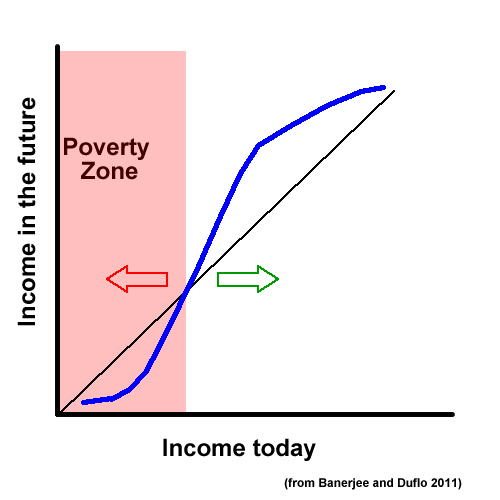
banerjee-duflo-2011.html
Banerjee, A. V., and Ester Duflo (2011). Poor Economics: A radical rethinking of the way to fight global poverty. NYC, NY, PublicAffairs/Perseus Book Group.
process of randomized trials
example of bed nets - what are the questions? Will people pay full price? If they are given of subsidized will people use them? After getting them at a subsidized price, will they ever pay full price again?
9 - "... Do they just live like everyone else, except with less money, or is there something fundamentally different about life under extreme poverty? And if it is something special, is it something that could keep the poor trapped in poverty?
ongoing debate about the effectiveness of aid efforts between Sachs and Easterly camps
Sachs - trapped because of geography, bad luck, diseases --> an infusion of the right type of aid would help, thus the Millenium Development Goals
Easterly - condition of poverty is not permanent
11- "There will be a poverty trap whenever the scope for growing income or wealth at a very fast rate is limited to those who have too little to invest, but expands dramatically for those who can invest a bit more."
pg 12 - the S curve

13 - "The most important message from theory embedded in the diagrams is that theory is not enough: To really answer the question of whether there are poverty traps, we need to know whether the real world is better represented by one graph, or the other." the other being a saturating hyperbola with no mid-inflection point
need to make the assessment case by case for fertilizer, education, birth rates, nutrition and health,
"The lack of a grand universal answer might sound vaguely disappointing, but it fact is exactly what a policy maker should want to know -- not that there are a million ways that poor are trapped but that there are a few key factors ....
14 - "This radical shift in perspective away from the universal answers, required us to step out of the office and look more carefully at the world."
15 - "... our basic premise -- that it is possible to make very significant progress against the biggest problem in the world through the accumulation of a set of small steps, each well thought out, carefully tested, and judiciously implemented."
16 - "The message of the book, however, goes well beyond poverty traps. As we will see, ideology, ignorance, and inertial -- the three Is-- " is what causes aid to fail
21 - nutrition based poverty trap